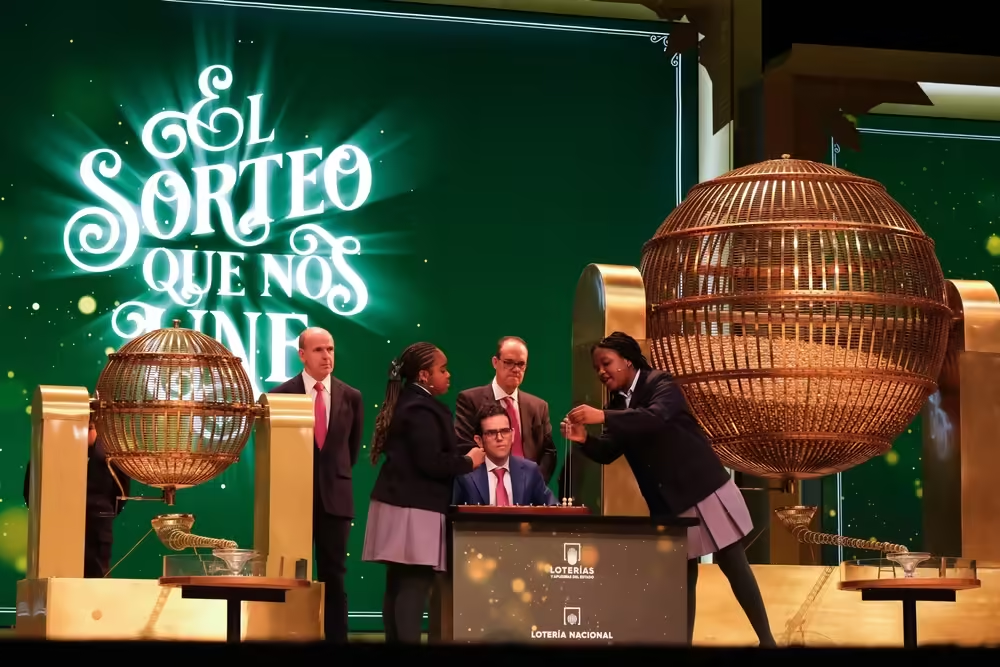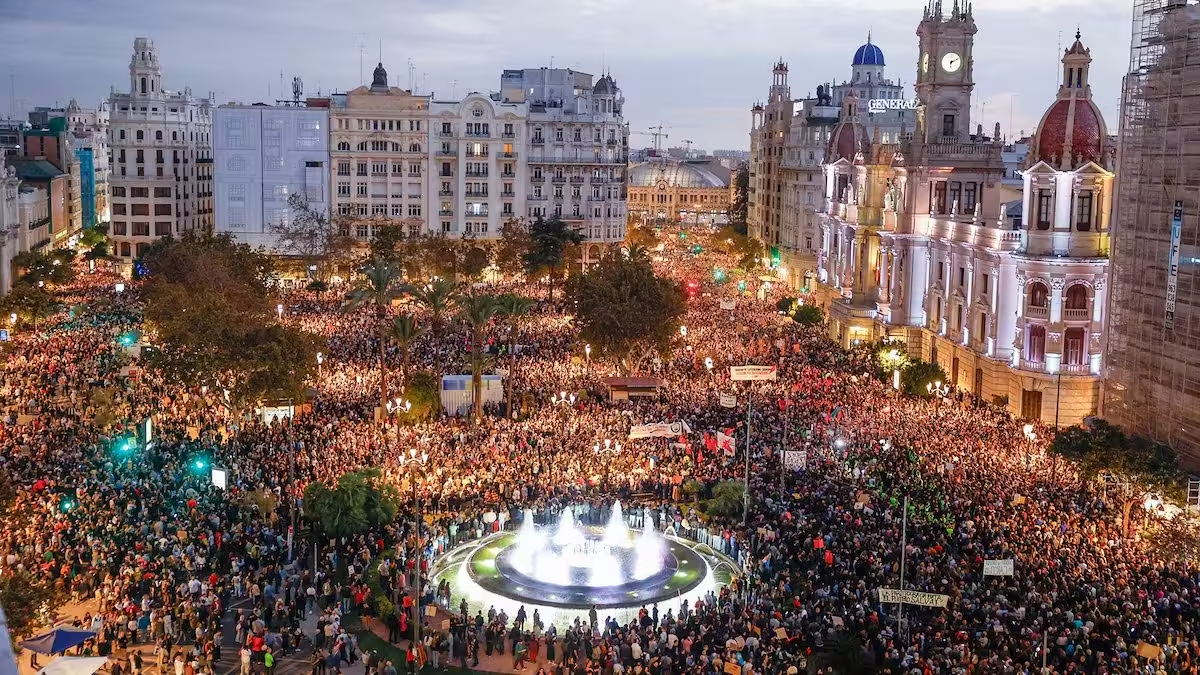El Gordo 2024: Spain’s Christmas Lottery Hits Big in Logroño
It’s December 22, and in Spain, that can only mean one thing: El Sorteo de Navidad (The Christmas Lottery). Across the country, voices of children from the San Ildefonso School ring out, singing the winning numbers. Homes, bars, and restaurants are filled with their voices and excitement as people dream of seeing their number come up, and maybe even hearing that they’ve hit El Gordo (The Big One) which is the main prize.
How The Spanish Christmas Lottery Works
Playing the Christmas Lottery is simple but unique. Each ticket, called a billete, is priced at €200. To make it more accessible, these tickets are divided into ten smaller parts called décimos, costing €20 each. This allows people to buy a share of the ticket rather than the whole thing, making it easy for families, friends, or coworkers to pool their money.
On the day of the draw, two large drums are used: one holds the numbers, and the other holds the prizes. A child from the San Ildefonso School draws a ball from each drum, and the pairing of the number and prize is sung aloud. The top prize, El Gordo, is worth an incredible €4 million per ticket, or €400,000 per décimo. There are also thousands of smaller prizes, making sure many people go home winners.
The History Behind The Spanish Christmas Lottery
This extraordinary lottery began back in 1812, making it one of the oldest in the world. The very first draw took place in Cádiz, where ticket number 03604 took home the top prize. At the time, tickets cost 40 reales, and the grand prize was 4,000 pesetas, a far cry from today’s incredible jackpots.
The term Sorteo de Navidad was officially adopted in 1892, replacing the earlier tagline, Prósperos de Premios (Prosperous Prizes). Over the years, it has grown into an iconic tradition, with its main prize, El Gordo (The Big One), becoming synonymous with December 22 in Spain.
A Meticulous Draw
Preparation for the lottery is meticulous. On December 21, the wooden balls representing numbers and prizes are publicly examined to ensure fairness. Made from lightweight and durable boxwood, these balls are laser-engraved to prevent discrepancies. Once counted and verified, they’re securely locked away.
On the morning of December 22, the venue—often the Teatro Real in Madrid—opens its doors at 8 a.m., welcoming spectators. By 9:15 a.m., the draw begins. Children take turns pulling balls from the two large drums: one for the numbers and one for the prizes. Each pairing is sung aloud in a tradition that’s been part of the lottery for generations.
The draw continues until all prize balls are distributed, with new groups of children taking over at regular intervals. Behind the scenes, a team of over 40 people makes sure everything runs smoothly, from recording the results to preparing the official prize list, which is distributed later that same day.
Today’s Big Winners
This year, El Gordo de la Lotería de Navidad 2024 went to ticket number 72.480, worth €400,000 per décimo. The entire series was sold in the capital of La Rioja, Logroño, at Administration No. 6 on Calle Muro del Carmen.
For Logroño, this marks the fourth time the grand prize has landed in the city since the lottery began in 1812, with previous wins in 1851, 1961, and 2014. The winning number was sung at 11:27 a.m. by San Ildefonso children Piero Rai and Alisce Ríos, with Aisha Solange and Isabella Palacios handling the ball extraction. The draw started at 9:12 a.m. at Madrid’s Teatro Real, distributing a total of €2.702 billion in prizes across 193 ticket series.
Lucky winners with prizes under €2,000 per décimo can claim their winnings at lottery sales points today after number verification. For larger prizes, payouts will begin at authorized banks like BBVA and CaixaBank, with major prize processing likely starting on December 23, as the draw fell on a Sunday. Winners have until March 24, 2025, to claim their prizes.
A ‘Falso Gordo’ Moment to Remember
This year’s draw also brought a humorous moment that will go down in lottery history. Yadira, one of the San Ildefonso children, caused a stir when she began announcing a number with the much-anticipated words, “Cuatro mill…” (Four mill…). The audience held their breath, thinking El Gordo had been announced again!
But within seconds, Yadira corrected herself, revealing the number was not the main prize again but a smaller prize known as a pedrea: “¡Miiiiiiiiiil eurooooos!” (One thousand euros!).
The room erupted in laughter, with a mix of relief and disappointment sweeping through the Teatro Real. On social media, the moment went viral under the hashtag #FalsoGordo, as viewers shared their reactions to what could have been a rare and impossible event: a second El Gordo.
While it was just a slip of the tongue, it’s moments like these that add charm and unpredictability to this beloved tradition.
The moment is trending on social media, with people across Spain on X (formerly Twitter) sharing conspiracy theories and discussing the unusual moment during the draw!
Solo por esto, se debería anular el sorteo #loteriadenavidad #LoteriaRTVE pic.twitter.com/U1Ed99inVh
— Ro 🦉🇪🇸 (@pitapulgarcit4) December 22, 2024
Looking Forward to El Niño
If you didn’t win big this time, don’t worry, the next chance is just around the corner with El Niño, the second major Spanish lottery draw of the festive season. Held every year on January 6, this draw offers a new wave of hope.
El Niño works similarly to the Christmas Lottery, with tickets priced at €200 per billete or €20 per décimo, but the odds of winning are even better. The total prize pool is smaller than El Gordo, but the draw still distributes significant amounts of money to participants, making it a popular follow-up event.
The name El Niño (The Child) refers to the arrival of the Three Kings and their gifts to baby Jesus, tying the draw to the Three Kings celebrations. Many who didn’t win in the Christmas Lottery try their luck again, keeping the holiday spirit alive into the New Year.
Hope for Those in Need
This year, people across Spain are especially hopeful that winnings will bring relief to regions affected by the DANA floods, particularly in Valencia. These communities have faced significant challenges, and a share of the lottery’s wealth could provide much-needed support to those rebuilding their lives.
The Magic of Sharing
One of the most unique aspects of the Christmas Lottery is the way it encourages sharing. Tickets, known as billetes, are divided into décimos (tenths), making it easy for groups to share the cost and, hopefully, the winnings. Families, friends, coworkers, and even entire villages often join forces, creating a sense of collective hope and celebration.
Even if you don’t win big, there’s a good chance someone you know will. That’s part of the magic, seeing the excitement spread through communities as prizes are announced.
As the final prizes ring out people across Spain are eagerly checking their tickets to see if they’re among the lucky winners. While the celebrations continue in Logroño, where this year’s El Gordo landed, many others are hoping for a smaller but still significant prize. To check if you’ve won, visit the official Loterías y Apuestas del Estado website. If you’ve won tag us on social media to join in the excitement of this iconic Spanish tradition.
Share this content:




3 comments